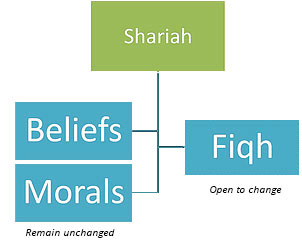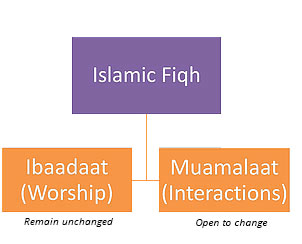We’ve heard our scholars say it, but is Islam really practical for all times and generations? If the Quran was revealed 1400 years ago, how can it possibly answer questions about the permissibility of modern technology? Organ donations? Anniversaries? Doritos? The answer, my friends, lies in Fiqh.
But what is Fiqh? First, we have to define the source of fiqh, Shariah.
BREAKDOWN OF SHARIAH
Shariah is a group of all the laws given to us by Allah, by way of Quran or Sunnah.

The Shariah can be broken down into 3 categories:
Aqeedah or beliefs, like belief in one God, the Day of Judgment, the angels
Aakhlaq or morals, like justice, honesty, helping the oppressed
Fiqh, all other practical legal actions
As for the first 2 categories, beliefs and morals, they were essentially the same for all prophets and messengers since Adam (AS), they haven’t changed since the establishment of mankind.
However, the last category, all other practical laws that govern day to day life (including ritual worship and interaction between people), this has changed from Prophet to Prophet based on their time, place, and circumstance. This category is what we know today as “fiqh”. A prophet’s “fiqh” was unique to him and his people, hence Jews, Christians and Muslims have different dietary laws, for example, and different ways of worshiping.
FLEXIBILITY OF FIQH
Now, Islamic Fiqh, being the last set of laws that will remain until the Last Day, is quite unique in that it is the MOST flexible of all laws. Rulings can change based on the time, place, situation and need. And as our scholars have claimed, it HAS the ability to work cohesively with every generation and time that’s to come. That’s the beauty of this religion! This can be evidenced by when the Prophet (S) sent Muaadh ibn Jabal to govern Yemen. The prophet asked Muaadh, if you do not find an answer to people’s questions from the Quran and Sunnah, how will you judge? Muaadh answered “أجتهد رأيي” meaning “I will do ijtihaad” – I will strive to form my own judgment. The Prophet (S) approved this methodology. “Ijtihaad” is when qualified scholars put in much effort to derive rulings from the sources of Shariah for issues that are not explicitly mentioned in the Quran or Sunnah.
But does that mean everything is subject to change at our whim? No, there are boundaries set forth within which scholars can work.
BREAKDOWN OF FIQH
Islamic Fiqh can be further separated into 2 subcategories:

Fiqh of Ibaadah (worship)
Fiqh of muamalaat (worldly matters and interactions)
As for worship (like prayer, fasting, zakaah, actions to get closer to Allah), this category of fiqh remains pretty much unchanged since the advent of Islam. The Quran and Sunnah has very specifically outlined actions of worship through definitive and clear wording, and actions mentioned clearly and definitely, we can’t deviate from. The legal maxim established by Islamic jurists is “Al Aslu fil ibaadaat at-tawaquf” meaning the default ruling in matters of worship is to STOP. That means Stop, don’t do anything more or less – unless you have clear precedence from the Quran or Sunnah.
For example, you can’t add a rakah to Fajr, you can’t make zakah just 1%, you have to follow the precedence. Scholars say that the wisdom behind acts of worship is generally with Allah, we may be able to see the practical benefits of it or we may not. Either way, we follow it as a matter of faith.
As for muamalaat or worldly interactions – that’s basically all other actions between man and creation. For example, business transactions, marriage laws, international relations, criminal law, what you can or cannot eat, or wear – and everything in between.
This category is the GAME CHANGER. THIS is where all that flexibility and ijtihaad can occur. The legal maxim established by Islamic jurists is “Al Aslu fil muamalaat al Ibaahah” meaning the default ruling in matters of muamalaat is ALLOWANCE. Green light! Go! That means all general actions, non-ibaadah, are allowed! Even if the Prophet (S) didn’t do it – until and unless there is an evidence brought forth that FORBIDS it either directly, through analogy or through other sources.
For example, all foods and drinks are allowed – EXCEPT what’s been forbidden like pig, alcohol, road kill, filth, etc. Through ijtihaad, scholars have deemed things permissible that the Quran and Sunnah never mentioned – like TV, the internet, playing basketball, drinking Dr. Pepper (as long as we don’t utilize them for Haram). So we can’t call something completely Haraam just because it didn’t exist in the past – by default it’s allowed – unless we bring forth evidences contrary to that.
Some parts of muamalaat are mentioned clearly and definitively, like rules of inheritance. In that case, we can’t deviate from that. But oftentimes, the texts in Quran and Sunnah related to actions of muamalaat (worldly interactions) are purposefully NOT clear nor definitive, Allah and his messenger have left them open, with only general rules and guidelines, but no specifications on how to follow through. THIS is where Fiqh can be adaptable to all generations. THIS is how Islam can come up with new rulings for phenomena that have no precedence – just as long as the ruling falls in line with the objectives of the Shariah.
APPLYING OUR KNOWLEDGE
So now that you know the breakdown, let’s take a look at a few examples: Driving cars. So the Prophet (S) rode camels, does that mean we can’t drive cars? No.. we look first, is this a matter of Fiqh Ibadah or Muamalaat? Since it’s got no relationship to worship, then it’s automatically under the category of muamalaat (worldly interactions). So yes, we can use cars because the default for cars is it’s allowed, because there’s no evidence that forbids it.
Another example – what to wear? the Quran and Sunnah explains WHAT to cover of our bodies, for women for example, it’s everything but the face and hands (and the feet according to Hanafis). Also, the clothing shouldn’t be really tight or transparent. This is an example of where a general outline is given, but no specifications of how that plays out. So that means, as scholars have determined – it’s left open ended. The color, the style, the way you wear it – it’s all allowed – as long as it fits within the guidelines that were outlined in the Quran and Sunnah. So your shalwar kameez, your skirt and pants, your kimono, your baju Malayu, your maxi dress – those are all essentially Islamically Shariah compliant clothing as long as they follow the guidelines! It’s not just an abaya that means “Islamic” – the default in this matter is everything’s allowed except what’s been made forbidden.
How about celebrating birthdays, anniversaries, Thanksgiving? The internet? How about organ donation? Invetro fertilization? None of these topics existed at the time of R(S), nor were specified in the Quran or Sunnah. But Alhumdulillah, the flexibility of fiqh and the process of ijtihaad are the tools that have allowed our scholars to derive rulings for these issues and many other issues throughout the different generations. What do the scholars say on those issues above? And what are all the sources for ijtihaad? And how is it actually carried out? That’s another discussion for another article, inshaAllah. 🙂
1111 Conrad Sauer Dr, Houston, TX 77043, USA | info@suhbah.com
© 2025 SUHBAH INSTITUTE. All rights reserved.